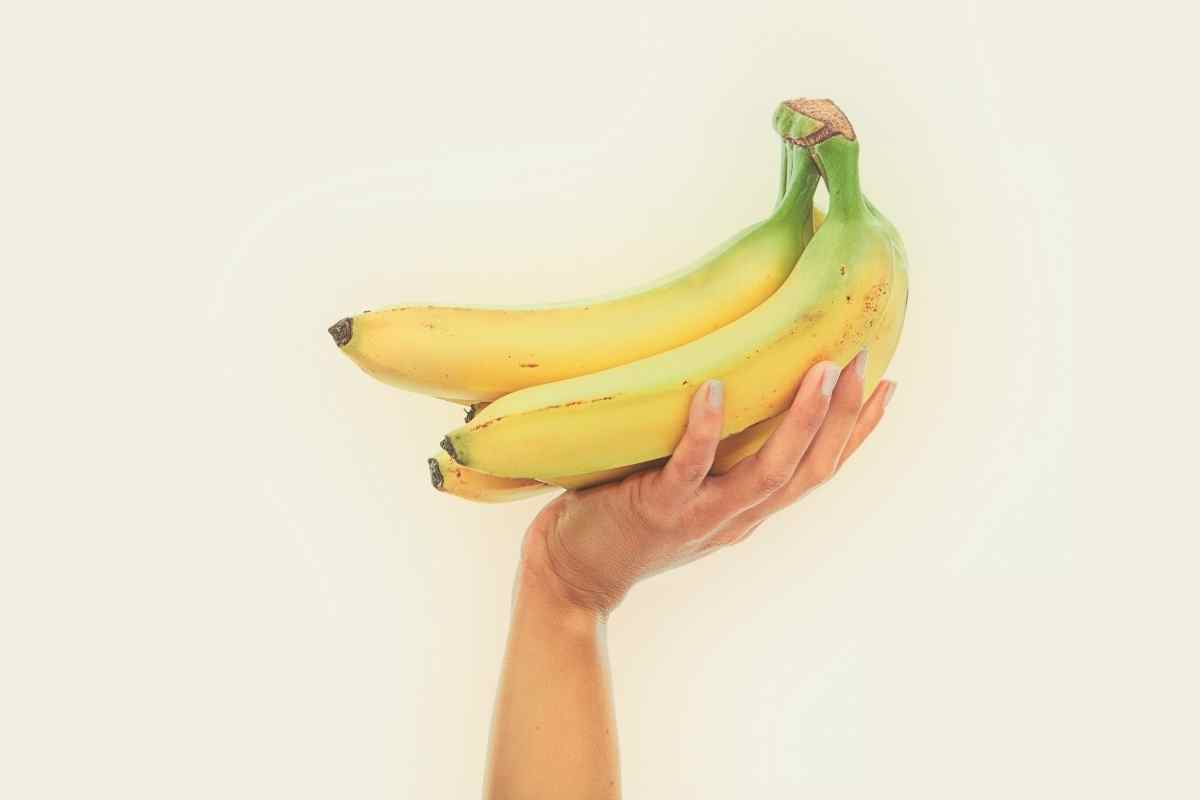The banana fruit goes through various developmental stages, one of which is fruit ripening.
In reality, ripening occurs the minute the fruit’s development is complete.
Nothing beats the flavor of fruit when it’s ripe, it has the most incredible texture, delectable taste, and alluring aroma.
Organic bananas are grown, harvested, and transported without the use of any synthetic chemicals. They ripen naturally and organically, with no chemical agents used. As a result, organic bananas will mature slower since they rely exclusively on the limited amounts of ethylene that they generate.
They may be harvested when they are around 75% ready and will continue to ripen off the vine for another 6 to 8 days if kept around 60 degrees Fahrenheit.
The Ripening Process of Organic Bananas
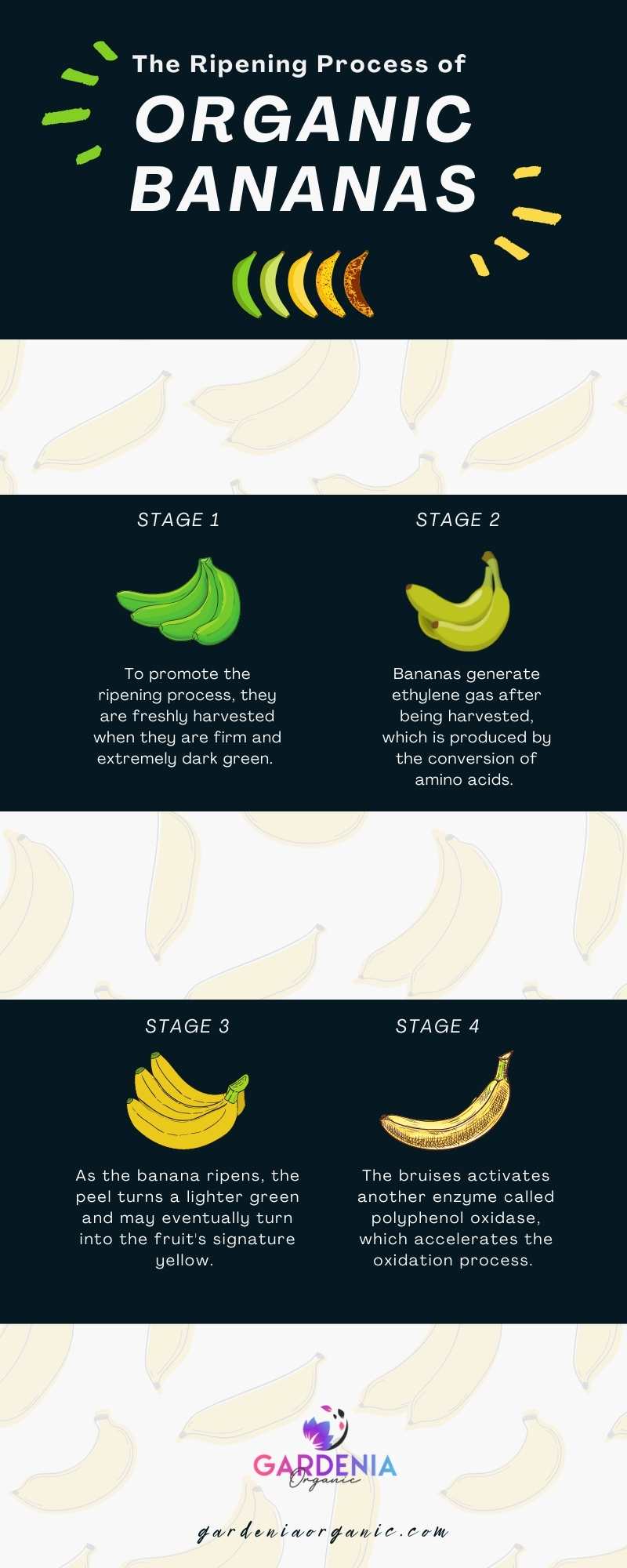
Stage 1
To promote the ripening process, they are freshly harvested when they are firm and extremely dark green.
If left on the plant, it will split open, and the fruit’s substance will change to dry and cotton-like.
Stage 2
Bananas generate ethylene gas after being harvested, which is produced by the conversion of amino acids.
This gas accelerates ripening by creating enzymes that break down the chlorophyll molecules that turn the banana skin green.
Depending on the banana variety, this changes the hue to a golden yellow with green remnants or shades of red or purple.
Quick Tip: At this stage, the ripening process has begun, but it will take some time before they are ready to consume.
Stage 3
As the banana ripens, the peel turns a lighter green and may eventually turn into the fruit’s signature yellow.
An enzyme called amylase transforms the starch in the fruit into smaller sugar components called glucose throughout this process, making bananas sweet and pleasant.
The enzyme pectinase softens the flesh from the chalky hardness of the underripe fruit by breaking down the cell walls of the fruit. The fruit is about ready to eat.
Stage 4
Bananas bruise significantly more easily as the peel softens.
This damage activates another enzyme called polyphenol oxidase, which accelerates the oxidation process.
The banana then begins to develop brown freckles and patches, finally turning virtually black.
At This Point: The bulk of the starch has been turned to sugar, providing the most sweetness, and the fruit is ready to consume.
Why Organic Bananas Take Longer and Factors Affecting Their Ripening Process
Ethylene Gas
Ethylene gas is a gas that makes the fruits ripen.
All fruits naturally produce small amounts of ethylene gas.
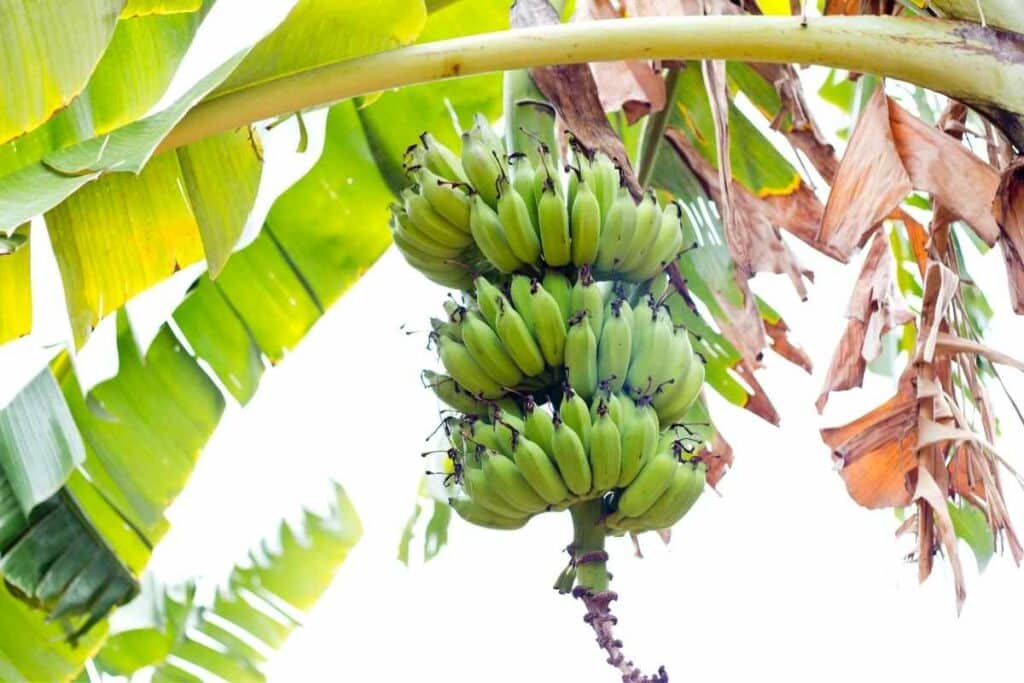
That’s why non-organic bananas are frequently sprayed with this synthetically manufactured ethylene gas to accelerate their ripening process.
However, a farmer can’t do this to organic bananas to retain their organic classification because artificial ethylene gas is not a natural process.
So, until they have had time to ripen up naturally, they will continue to ripen more slowly since they are not exposed to a lot of ethylene.
Peel Thickness
When compared to non-organic bananas, organic bananas have thin skin.
Due to the thin peel, they are more vulnerable to losing more water.
Water loss causes organic bananas to lose their firmness, the peel becomes soft and shriveled, reducing the ripening period.
Biotic Factors
Bacteria, fungus, insects, and viruses contribute significantly to overall postharvest loss.
Pests and illnesses shorten the ripening period and lower the overall quality of organic bananas.
This is due to the inability of a farmer to apply fungicides (chemical control) to infected organic bananas to eliminate viruses.
How to Speed the Ripening Process of Organic Bananas
Organic bananas ripen naturally at room temperature, but if you are losing patience, there is a few things you can do to speed up the process.
Keep Them In a Bunch
Suppose you want your organic bananas to mature faster than they usually would, the first thing to remember is to not separate them.
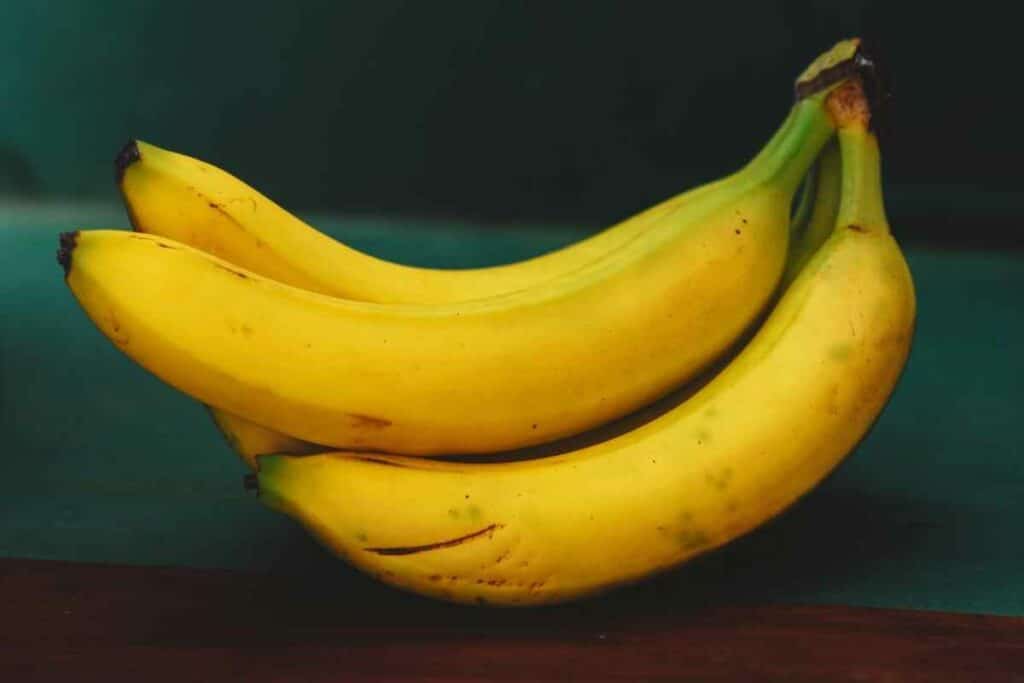
Only separate the ripe ones that you wish to eat and let the others alone.
If you want them to ripen more slowly, divide them and wrap the stems with cling film to prevent the gas from escaping.
Bananas maintained in a bunch will ripen faster than if they are separated.
This is because, by keeping your bananas together in the same container or wrapping them in a foil, the cumulative effect of all of them releasing gas ripens them more quickly.
Furthermore, increased consolidation means that more ethylene circulates in a single spot.
In a Bunch: They take about 24-48 hours to ripen.
Using a Plastic Paper Bag
When bananas emit ethylene gas, it processes the sugars within the fruit, causing the banana to soften and change hues.
The higher the quantity of ethylene gas in the surrounding air, the faster the banana will ripen.
You may reap the benefits of ethylene’s ripening properties at home by using a plastic paper bag.
To make bananas ripen faster, place the bananas in a sealable paper bag and then seal.
The bag creates an incubator effect around the fruit by trapping the ethylene gas in the air near it, causing it to ripen faster:
- You can add a couple of ripe bananas, apples, or avocados for even faster ripening because they increase the amount of ethylene gas flowing in the bag.
- Check them at regular intervals to ensure they are ripe the way you want them to be.
- Plastic paper bag ripening will take 12-24 hours, depending on how under-ripe your bananas were initially
Using Brown Paper Bag
In the same way, you can use plastic bags to ripen your organic bananas, you can also use brown bags.
Using the brown paper bag method is preferred to plastic bags especially if you’re in a hotter climate or during the warmer months.
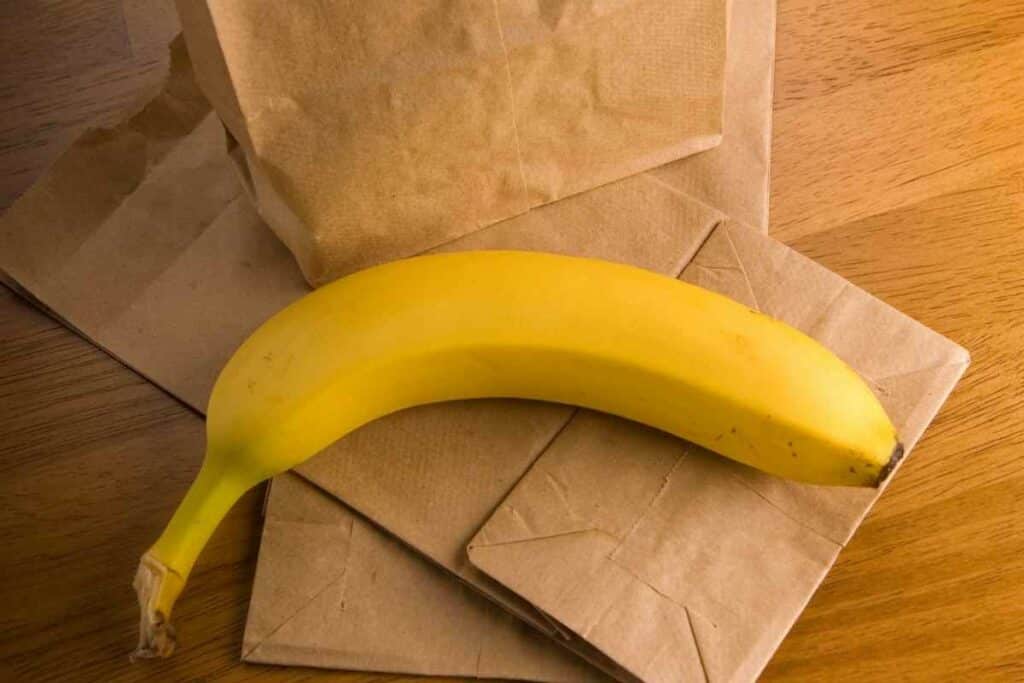
This is because plastic bags are airtight which may lead to sweating and overheating of your organic bananas.
Place bananas in a brown bag (the same rule applies, make sure they are in a bunch) and close loosely by folding down the top.
Excellent Advice: The brown bag will let your bananas breathe and still trap the ethylene gas near the fruit, causing it to ripen faster. The bananas will take one to three days to mature.
Keep Them In Warm Places
Whichever method you prefer to use; always keep your organic bananas in a warm area.
The ideal temperature for ripening organic bananas is around 60 degrees Fahrenheit.
The ideal place for this temperature includes:
Top of the Fridge
Put a bag containing unripe bananas on top of your fridge towards the back where the heat radiator is located and it generally always heated.
The fridge radiates heat as it cools the food inside.
Bake Them In the Oven
This approach works, but a few requirements must be met:
- Before beginning the process, the bananas cannot be too green.
- It is best done when ripening bananas for recipes since heat pulls out the sugar in the fruit.
- Preheat oven to 300°F. Place unpeeled bananas on a baking sheet lined with silicone or parchment paper (the bananas might leak a little while baking) and leave some space between each banana.
- Allow them to bake for 20 minutes, then check them regularly if they are tender enough.
When the peels become glossy and black, they’re ready. They should take about 30 minutes to complete.

The more under-ripe they are, the longer it will take for them to ripen. The peels will turn black, and the fruit will get soft – too mushy to eat raw but excellent for baking.
Use the Microwave
They won’t be as sweet as oven-ripened counterparts, but they’ll work in muffins and quick bread:
- Use a fork or a sharp knife to fully penetrate the skin of the unpeeled bananas on both sides.
- Then place them on a plate or a paper towel to dry.
- Once completed, microwave for thirty seconds to two minutes at a time on high.
- Repeat until the appropriate level of ripeness is reached.
In the Sun
Please place them in the sun on a windowsill.
Depending on how hard and green your bananas are, it can take anywhere from one day to four or five days for them to achieve their desired ripeness.
Final Thoughts
Organic bananas are delicious, healthy and can be used to make many dishes and desserts.
Buying organic bananas when they are already ripe can cause them to rot sooner.
This is why many prefer to get them when they’re still raw. The good news is that you can control the ripening process of these fruits from your kitchen.
As organic bananas ripen, they emit ethylene gas.
This invisible gas encourages additional ripening, making it a helpful tool for hastening the process in fruits that are harvested and shipped to market before they are fully mature.
Ethylene aids in the conversion of starch into sugar, giving the fruit its distinctive sweet flavor, softening the flesh, and making the peel yellow.
